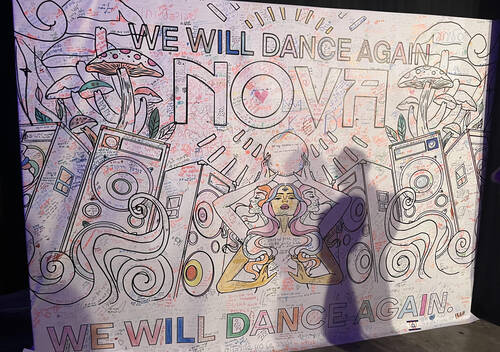Sol Glasner - Letters from Israel
04/20/2024 09:59:04 PM
Rabbi's Note:
Sol and Nina Glasner recently spent a month as volunteers on Israeli farms in January-February, helping to save the harvests after terror attacks and war disrupted life. With their permission, I'm sharing most of the letters that Sol sent. He also gave a talk at Seaside about their work, the people they met, and the feeling of life in Israeli during wartime. Due to technical limitations, I could only share a selection of his dozens of wonderful photos - I'm sure Sol would share the entire series with you if you ask! (Thank you to Donna Benton and Scott Waxman for helping me to get this posted.)
Rabbi Julie
January 15, 2024
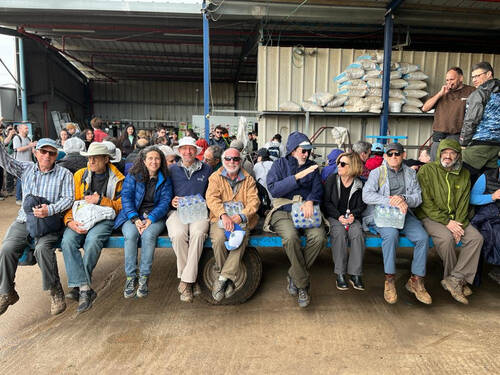
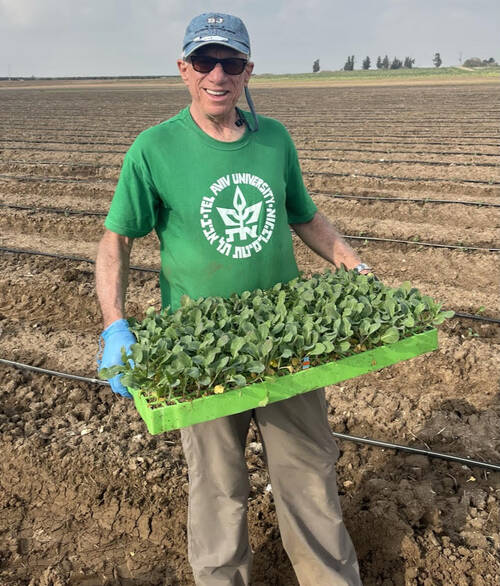
Dear family & friends,
I'm now at the close of week three of my time in Israel as a volunteer farmer. For most of last week, we mainly continued planting fennel seedlings in fields that otherwise would have gone bare. But, really? Who eats all this fennel anyway?? To date, I've personally inserted more than 5000 fennel seedlings into the ground. Collectively, we've planted well in excess of 100,000 little fennel seedlings! We did this slogging through muck in fields awash with rainwater.
It was hard work just to overcome the sucking force of the mud so as to move along the rows. But the feeling of accomplishment when gazing over a planted field is grand.
Earlier this week, we were back to assembling cartons used to ship the farm's produce to market. Since it was a beautiful day, well suited to field work, we asked the farm manager why the box assembly work wasn't being delayed till later in the week when rain is forecast. His response speaks volumes about the cascading effects of the 10/7 attack and its particular implications for the country's agricultural production. The hundreds of empty shipping cartons we assembled only a few days earlier were now filled with produce waiting to be loaded onto trucks for shipping.
The farm needed more boxes to accommodate the new week's output. Before 10/7, the farm purchased fully assembled boxes. After 10/7 the (West Bank) Palestinian Arab workers doing the assembly are barred from entry into Israel and the farm's supplier is unable to provide assembled boxes. As a stopgap, volunteer groups like ours are performing the assembly work--obviously not a long term, sustainable solution to this supply chain problem.
The privately owned Seyshell Farm is part of the Giv'ati "moshav" (collective community--similar to a homeowners association). Curious about the people working the moshav fields, a descendant of one of the moshav founders visited us while we were working. Visibly moved and nearly dumbstruck by our spirit of volunteerism and the simple act of our being in Israel at this time, he offered to arrange for a tour of the moshav as an expression of appreciation. We learned that in addition to fennel, cauliflower and other vegetable crops, the moshav is Israel's largest producer of milk, upwards of 1 million gallons annually. In another example of the impact of the worker shortages, we were told that the dairy is able now to milk their 300+ cows only twice a day compared with 3x daily before 10/7. The Palestinian Arab workers who performed this work have been employed by the moshav for 30 years. The manager of the dairy continues to pay them, in hopes that the government will find a way to relax the work permit embargo and that the workers will soon be able to return.
On the rainy days this week, we harvested cucumbers and tomatoes in sheltered greenhouses at Ozer Farm, working alongside a delightful group of Tanzanian workers, who've been on the farm since September as part of an 11-month agricultural internship program. Following the internship, they will take their newly acquired modern agricultural knowledge and skills back to Tanzania.
On Tuesday, another dark day in Israel's recent history--23 soldiers fell in Gaza-we intersected with a group of IDF personnel who were detailed to the farm for a few days. Soldiers and volunteers talked excitedly with each other, traded selfies and expressed mutual admiration. We also met other volunteers, including a group from France and also an Israeli yeshiva group. Midweek, our family farm owners, Shalom and his wife, Carmel, and Shaoul and wife, Esther, hosted us for an afternoon bbq at their home on the moshav. Some in our group had expressed concern that the bbq would take away from valuable time in the fields--but the manager of our Israel Food Rescue program told us that to decline the family's invitation would be doing them a dishonor. The family was looking for a way to demonstrate appreciation for all our efforts which are helping to help rescue their farm. They seized on the bbq as a way to reciprocate and there was no way we weren't going to be there.
It was a wonderful and truly heartwarming scene. Heaps of chicken skewers, kababs, hamburgers and chicken wings were accompanied by whole roasted eggplant, roasted cauliflower, pita bread and, of course, a variety of mezze salads--all seasoned and grilled to perfection.
Round of appreciation speeches followed. The family told us how much our presence means to them -- not only because of the tangible support we're providing, but also because it helps make them feel like they're not alone in the world. We, in turn, thanked the family for giving us an opportunity to do something meaningful and constructive at a time of such devastating loss.
My third work week ended yesterday, again in the greenhouses, but this time pruning tomato plants. Most of us, including backyard tomato gardeners like me, knew little or nothing about this process. Guided and supervised by the Tanzanians, we became quite proficient by day's end--and finished pruning a greenhouse full of what started as unruly plants. I look forward to applying this pruning lesson to my home garden!
***
I'm excited that Nina is arriving in Israel this afternoon to join me for my final week in Israel. She figured I was having way too much fun and wanted to join in. We're looking forward to a Shabbat in Jerusalem visiting with friends before beginning the new work week early Sunday morning. Unfortunately, the weather forecast for the next few days is wet and cool.
In my next "postcard," I'll write about my fellow volunteers. My experience here hasn't been only about work in the fields-- it's also very much about the diverse assemblage of people who've been drawn to come together at this moment in time for the purpose of helping Israel fill an urgent and immediate need.
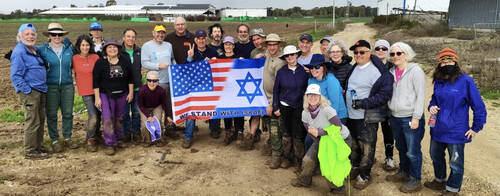
Shabbat shalom,
Sol
January 30
Dear Family & Friends,
Nina arrived in Israel last Friday and jumped right into the rhythm of our volunteer farmer life. We're back to the greenhouses and likely to be working there for the rest of the week because of the continuing rains. We began our work week attaching cucumber vines to vertical support strings. After demonstrating our skills in harvesting and boxing cucumbers and tomatoes, we graduated to pruning the growing cucumber and tomato plants.
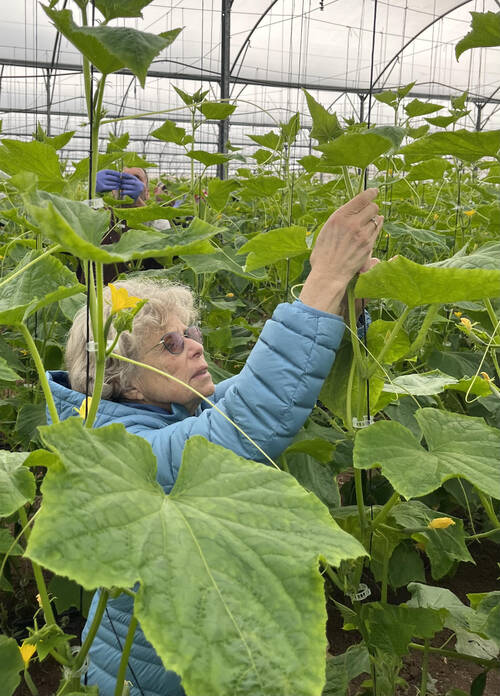
Pruning cucumber plants--more complicated and detailed than you think! Can you tell the difference in a cucumber plant between the main stem and the "shoots"? If not, you may inadvertently kill the plant!! How's that for pressure?
Lovin' those tomatoes
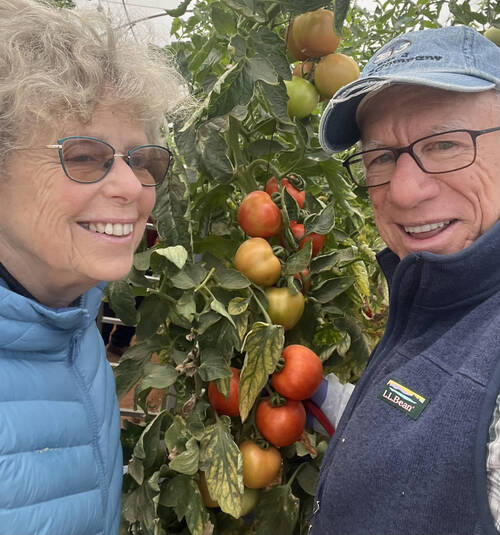
***
My experience here is about far more than our work on the farms-- it's also about getting to know the diverse and interesting people who've paused their lives and come together at this moment in time for the single purpose of helping Israel fill an urgent and immediate need.
Volunteers on the Israel Food Rescue program join for varying lengths of time, from a week to five weeks. By the time I wrap up my participation at the end of this week, I will have been here a month. Over the course of that period, the size of our group has ranged between 20-40 participants; ages are clustered around the 50s and 60s, but we've ranged up to 82 and down to 22. On average, male and female seem to be about evenly divided. Most participants come alone, but there've been a handful of couples, siblings and others traveling with a friend or other relation.
Day jobs, past and present, include educators, engineers, lawyers, business people, a physical trainer, healthcare workers, a children's book author, a landscape designer, social workers, scientists and others. We've also had a retired couple in their 50s who spend eight months out of the year sailing the Mediterranean on their 40 foot catamaran! I offered them my expert crew services. Though mainly coming from all parts of the U.S., we've had representation from around the world, including Mexico, Switzerland, Holland, Australia, Luxembourg, England, Canada, Russia and Hong Kong! Surprisingly (though maybe it shouldn't surprise), a significant minority of participants are not Jewish. Mostly they are motivated by a deep, religiously inspired faith in the land and affinity for the Jewish people. Two sisters from Australia--Christian, and both teachers living on their family farm, spent the last two weeks of their summer break on the program. When asked why, they said their love for the Jewish people and homeland made the decision a "no-brainer." "This wasn't a choice. We had to come," they said.
Another non-Jewish participant, married to a Jew with a family Holocaust history, teared up when talking about his one-year old granddaughter in context of the baby who marked his first birthday as a Hamas hostage in Gaza. He felt he needed to do something and "didn't feel right sitting at a computer pushing a 'Donate' button." One woman shared with us that cousins--whom she only recently discovered to be her relations-- were killed on 10/7 in their "safe room." Being here, working with her hands, was this woman's way of coping with the numbing anguish she is experiencing.
Another man, here for five weeks, said that joining this effort is his way of transcending the battleground among the different strands of Jewish ethnicity and identification that was his home growing up; Ashkenazi, Sephardic, Orthodox and Reform. He sacrificed milestone family moments, such as his wife's birthday in order to be here. He told us that he bristled when a work colleague, treating his experience like a mid-life crisis, asked him whether he's now "gotten it out of his system."
Sammy, a Christian from Hong Kong, said "I'm a believer in God and I love Jewish people, that's why I'm here."
One woman in her 30s, born and raised Greek Orthodox, is in the process of converting to Judaism. She doesn't know what exactly draws her to Judaism and to Israel, only that she has felt that pull since her late teens.
Our Russian participant has been trying for seven years to immigrate with her mother to Israel. I assume the difficulties she's encountering are due to questions about her qualification for immigration under Israel's Law of Return. She has been to Israel multiple times and is determined to succeed in her quest. When in Russia, she told the group, she's "not able to exhale."
Each night, over dinner, we welcome newcomers and bid farewell to those who are leaving. The stories that unspool at these sessions have been a highlight of my day. They describe a multitude of life experiences feeding into the desire to serve here and now. People are grateful for the opportunity to do something positive and meaningful at a time when so much in the world is going wrong and beyond their control. One participant characterized her time with the program as "magical." Another said the experience helped "lift the darkness." Another said he hopes our work made a "little dent." Being in our group, he said. proves "there's a worldwide conspiracy to make the world a better place."
Sol
February 5
As interesting, meaningful and even fun as it's been to work in Israeli agriculture, overshadowing everything--all the time-- is the harsh and unavoidable reality of a country at war, fought in the aftermath of a searing trauma that now colors all life. No matter how "normal" things may appear, no matter how crowded the cafes, no matter how well people seem to be navigating their daily routines, roiling emotions lie just below the surface. Everyone is, at most, one degree of separation removed from someone serving in harm's way---or worse-- someone injured, killed or taken hostage on October 7 or who has fallen in the ensuing war.
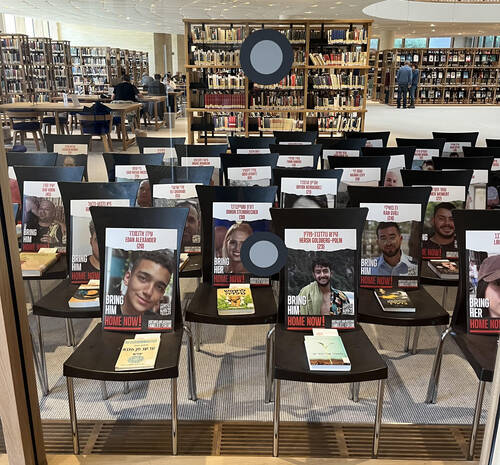
A visit to the newly named "Hostage Square" in Tel Aviv brings you face to face with hostage families, each eager to share their story with a willing listener, and each story more unbearable than the other.
Shortly after my arrival in Israel, I attended an exhibition in Tel Aviv documenting the Nova Festival-- a celebration of life, humanity, spirituality, music, dance and art held in Israel's south on October 7 and turned into a slaughterhouse by the marauding Hamas invaders. Festival survivors guided visitors around artifacts salvaged from the festival site. Visitors are invited to write cards honoring those who perished or are held captive.
